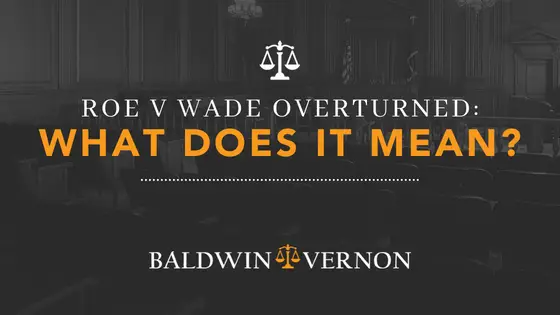On June 24th, 2022, Roe v. Wade was overturned on a 5-4 vote, ending an almost 50-year federal protection over abortions in the first trimesters of a pregnancy.
With the overturn causing an uproar of protests and social media activity, many are now asking what happens next and what it means to them. The decision to overturn Roe v. Wade was leaked back in May, leading people to be unsure if a right given to them in 1973 would be taken away almost fifty years later.
Now that it has, it is essential to understand what this looks like in each state and how it affects people everywhere.
Is Abortion Illegal Everywhere in the U.S. Now?
No, but is has become illegal in many states. The right to safe abortion was taken away federally, but this now allows each state to enforce its own laws in place of the right that had been guaranteed by the holding of Roe v. Wade. As of right now, many states still allow abortions, however, some state legislatures had previously passed “trigger laws” which would then come into effect if and when Roe v. Wade was overturned.
Abortion, except for a medical emergency, is now illegal in Missouri. Missouri is one of those states that previously passed a trigger law and once Roe was officially overturned, any abortion in the state of Missouri, regardless of how far along the pregnancy might be, became illegal. This act specifically prohibits doctors from performing abortions unless there is a medical emergency. It also makes anyone who performs an abortion outside of a medical emergency, or who entices a non-medical emergency abortion criminally liable, and subjects a doctor’s license to suspension. There is NO EXCEPTION FOR RAPE OR INCEST UNDER MISSOURI LAW.
States more likely to ban abortions are those in the South, Great Plains, and Midwest, leading people who need an abortion to travel to other states to get the service they need.
In the U.S, thirteen states, including Arkansas, Idaho, Kentucky, Louisiana, Mississippi, Missouri, North Dakota, Oklahoma, South Dakota, Tennessee, Texas, Utah, and Wyoming, have enacted trigger laws that automatically banned abortion rights in the first and second trimester in the event of Roe v. Wade being overturned.
With the overturning of Roe v. Wade still new and affecting many people and states, it is essential to stay up-to-date on where abortion is both legal and illegal to understand your rights and options better.
How Will Abortions Change?
Safe abortions became the norm in 1973, following the Supreme Court’s ruling in Roe v. Wade that the right to an abortion in the first trimestes is embodied in the bill of rights. Once the court ruled that the states could no longer prohibit abortions, patients were able to walk into hospitals and well maintained and licensed clinics to obtain licensed professional care for their abortion. This worked to help keep women safe and give them the option to decide on their bodies. Becasue prior to the holding in Roe v. Wade many states criminally prosecuted any abortion, abortions were performed like drug deals – secretly and with great danger. This resulted in Improper medical treatment, unsafe medication or pills, and deadly treatments being used before, and it is likely to see women and abortionsists try to utilize some of these tactics again.
Many may look to ordering pills that can help or traveling to other states to get the procedure done properly. However, many women seeking abortions may not be able to travel to far-off states, leading to lower abortion rates but higher unsafe abortions, as this country saw before the passing of Roe v. Wade in 1973. Likewise, because of the varying understandings and opinions about when “life begins” (i.e. fertilization, conception, implantation in the womb, viability, heartbeat, birth, etc) , we can expect that some states will outlaw many popular forms of contraception that are seen by some as abortifacients.
Who is This Likely To Affect?
In this country, one in four women will likely seek to have an abortion. Under Roe, this was a protected right and could be safely obtained; however, now, women who come from a variety of backgrounds, are seeking medical help, already have children, or can’t afford a child are going to have to seek help in other states or by other means.
In states that have actively banned abortion after the overturning of Roe v. Wade, many women will be affected and need help elsewhere. In these circumstances, understanding the abortion laws in your state and seeing how you fall in those categories is essential when figuring out your rights and possible options.
What Are The Abortion Laws in Missouri?
Many new regulations were implemented in Missouri with the overturn of Roe v. Wade. Starting on June 28th, 2022, abortion was banned except in the case of life endangerment or if the patient’s health is severely at risk. There is NO EXCEPTION for rape or incest under Missouri’s law. In addition, patients must receive state-directed counseling that is biased towards saving the baby. Then 72 hours must be given as wait time from after the counseling to when the patient decides to either save their life and seek the medically necessary procedure or possibly die from complications.
There are now movements within restrictive states to try and prevent pregnant women from traveling outside their states to receive abortion and/or family planning services.
What Are The Abortion Laws in Kansas?
Kansas recently enforced its first abortion-based law since the overturn of Roe v. Wade. As of August 2nd, 2022, abortion in the state of Kansas is legal up until 22 weeks. With its five abortion clinics around the state, Kansas is allowing abortions for its residents and civilians around the country. On August 2, 2022, Kansas voters resoundingly decided against removing the right to abortion from the State Constitution.
Does Missouri’s Anti-Abortion Law Outlaw Contraception and Some Fertility Treatments?
Some birth control methods, specifically the morning after pill and IUDs, permit an egg to be fertilized but prevent the egg from implanting in the uterus. These could also become restricted since the supreme court overturned Roe v. Wade. Technically, under Missouri’s current law they could be considered illegal if the law holds that life begins at fertilization. That would then mean birth control pills or devices that cause the body to prevent fertilzed eggs from implanting in the uterus would be considered an abortifacient – thereby being illegal to proscribe, implant and/or ingest under Missouri law. Missouri’s trigger law made NO exceptions for oral or implanted birth control and/or non-surgical abortions and, as such, anything that would be taken to prevent the implantation and growth of a fertilized egg would be illegal under Missouri law. That means most oral contraceptives, as well as IUDs, since one of the features they provide as a back-up is to prevent attachment of a fertilized egg.
What about in-vitro fertilization (IVF)?
In-vitro fertilization (IFV) practices will also be impacted. Under the current Missouri law which was enacted upon Roe being overturned, fertility doctors will likely be unable to implant more than one or two embryos. Normally, guidelines call for the transfer of one or two embryos per IVF cycle in younger patients with the best prognosis, and as many as four embryos per cycle in patients in their late 30s and 40s with a poor chance of achieving a pregnancy. This may no longer be allowed as they would not later be able to engage in selective reduction to allow a viable pregnancy as opposed to a woman with fertility and medical issues being forced to try and deliver quadruplets if four implanted embryos began to grow. Or, quite possibly, IVF may NOT be allowed at all if there is any chance that an implanted embryo will not survive since that itself may be seen as causing it to be aborted. As such, IVF may become outlawed in certain states such as Missouri which have no such exceptions for it under the law.
People are in for a shock as to how many rights they once took for granted have been taken away and how their state government will try and dictate their family planning.
As laws change quickly and states are given the opportunity to govern themselves, it is important to understand your rights. With the overturn of Roe v. Wade, many states are going to start implementing new regulations; if you have any questions about your rights and what the abortion change means to you, please reach out to the team at Baldwin & Vernon.







